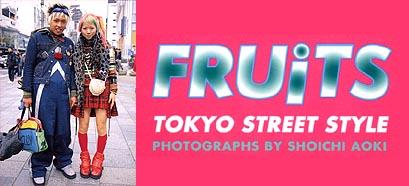26/12/2002
FRUiTS
Powerhouse Museum, Sydney

Tokyo Street Style - Photographs by Shoichi Aoki
The Powerhouse Museum and Sydney Festival are presenting a new exhibition FRUiTS: Tokyo street style - photographs by Shoichi Aoki from 21 December 2002. The exhibition showcases a vibrant and engaging collection of photographs taken in Tokyo between 1997 and 2002. The images capture a radical Japanese fashion subculture that has inspired fashion designers worldwide.
FRUiTS: Tokyo street style is part of the visual arts program of Sydney Festival 2003 and is the first major exhibition for Japanese photographer Shoichi Aoki.
Shoichi Aoki began documenting street fashion in Tokyo's fashionable Harajuku area in the mid 1990s when he noticed a marked change in the way young people were dressing. Rather than following European and American trends, people were customising elements of traditional Japanese dress - kimono, obi sashes and geta sandals - and combining them with handmade, secondhand and alternative designer fashion in an innovative 'DIY' approach to dressing.
In 1997 Shoichi Aoki established the monthly magazine FRUiTS, now a cult fanzine with an international following, to record and celebrate the freshness of fashion in Harajuku. All photographs in the exhibition were originally published in FRUiTS.
Melanie Eastburn, curator of the exhibition, said: "Shoichi Aoki's striking portraits provide a fascinating insight to the lives of a group of young Japanese people who express their individuality and fixations through their clothing."
Far from an impersonal record of style, each photograph is accompanied by the name and age of the subject, a short description of their outfit and its origins and the subject's own explanation of their fashion inspirations and obsessions. According to Shoichi Aoki, the fashion featured in FRUiTS is "more about the art of 'putting things on' than the art of making clothes."
He said: "Because western clothing has a short history in Japan, there is a strong tendency for people to dress in the same style as each other ... In Japan, having a different style is a kind of risk..."
"Therefore the fashion movement that came about in Harajuku was a revolution. This kind of fashion was not 'suggested' by designers, but rather, the fashion of the young inspired the designers."
Some of the many styles seen in FRUiTS include punk, cyber and decora, in which simple garments are accessorised with toys and plastic jewellery that clink together to add an aural dimension to dress. Clothing inspired by cartoon characters like Sailor Moon are also popular. In the last couple of years 'elegant gothic Lolitas' have had a strong presence in Japan. This style takes Harajuku's doll-like 'Lolita' look into a harder world of black lace crinolines, corsets and bat-shaped handbags.
In addition to individually devised and handmade outfits, each 'look' has its own avant-garde designers and brands. Outfits and accessories by Baby the stars shine bright, Takuya Angel, 20471120, Ohya and Christopher Nemeth will be exhibited alongside colourful 'DIY' garb sourced by Shoichi Aoki direct from the pages of FRUiTS.
Featuring more than 30 of Shoichi Aoki's large portraits and a selection of extraordinary clothing, FRUiTS: Tokyo street style celebrates the spirit of Harajuku and documents an inspirational moment in Japanese fashion and popular culture.
Opening hours and charges:
Powerhouse Museum is open every day of the year 10am - 5pm (Closed Christmas Day).
Powerhouse Museum 500 Harris Street Ultimo, Sydney NSW 2007 Australia
Telephone:612 92170111
Fax: 612 92170333



